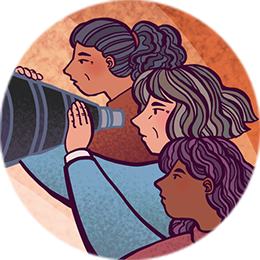A Post-Radical Cystectomy Gynecology Experience
About 4 months after I completed active treatment, I went to a new gynecologist. It was my first gynecology appointment after receiving a radical cystectomy. After 2 office visits, prescribed medication, and multiple attempts, she was unsuccessful in satisfactorily completing the pelvic exam. I was experiencing extreme pain, and she could not see enough of what she needed to see.
She asked to consult with a colleague. Still distressed from the pain, I gladly agreed.
I had previously had several pelvic exams and enjoyed sexual intercourse without any pain at all, so I was just as floored by the pain and discomfort as she was.
We were also both very concerned.
First post-radical cystectomy gynecologist appointment
She stepped out of the room and returned a few minutes later. She sat in front of me on the rolling stool, looked me straight in my eyes, and said, "I don't know what to do with you."
I nearly burst into tears. After being misdiagnosed with bladder cancer for at least 2 years, this did not make me feel so great.
A referral to a gynecological oncologist
She explained that I did not fit into any of the pre-determined boxes that gynecologists have for treating women due to all the anatomy changes I had. Instead, she was going to send me to a colleague - a gynecological oncologist.
My jaw dropped. What?! Back the turnip truck up because I thought I had just finished with all that oncology mess!
She continued and told me she did not think that there was any cancer but that the oncology gynecologist would be able to complete the exam under anesthesia, whereas she could not. Also, the gynecological oncologist would be more familiar with the anatomy changes I had and how to deal with them.
I felt a little better, but still, I wanted to cry.
A gynecological oncologists and a colposcopy
Thus began my journey with my gynecological oncologist MD and NP. They are wonderful people who I adore, but I really wish I did not need to see them as much as I do.
Shortly after we first met, I had my first colposcopy, an examination of the cervix, vagina, and vulva, under anesthesia. Many women have had this procedure but usually do not realize it usually occurs in the GYN office. Hint: if you have had an abnormal PAP smear, you have probably had one!
An appointment with the gynecological oncologist
I could consider myself luckier than most as not only do I get to have these every 6 months to 3 years, but I get to have them under anesthesia... for the rest of my life.
With the tumor involvement I had and the removal of my bladder, ovaries, fallopian tubes, uterus, pelvic lymph nodes, and part of my cervix, you might be able to imagine that a lot has changed for me below the waist. My doctor does this procedure to make sure that no cancer spreads or develops, checks for the health of the tissue, and looks for vaginal atrophy. Sometimes she even "stretches some things out" to activate those muscles again, which also helps with future exams.
It is as unpleasant as it sounds. I just had another recently, so it is all fresh in my mind.
What to expect
Typically after this procedure, I am sore for about 4 days. When I leave the hospital, I ask for feminine hygiene products since I no longer keep them at home.
This was one of those times that she stretched things out. I was sore for almost 2 weeks, and the pain lasted a lot longer.
The full radical cystectomy impact
I am grateful to have the support of the medical team I have on this road. I am grateful for the initial GYN being honest and referring me to a professional with the skillsets to handle my unique case.
Being diagnosed at 40 and currently being 45, I hope that I have a good 30-40 years left in this life. Looking at the long term, that is a lot of procedures to endure. It is a lot of anesthesia over time as well.
My doctors did not give me a full picture when I received my initial diagnosis. I was not prepared to deal with this for life. However, if it keeps me healthy and alive, I am going to continue doing it.
Moving forward
If you are still seeing a regular gynecologist and having a lot of pain during exams or intercourse, speak with your GYN, oncologist, or urologist about a referral to a gynecological oncologist. You can move forward with a much more positive, less painful experience with someone who understands what your body has been through. Trust me. You can thank me later!


Join the conversation